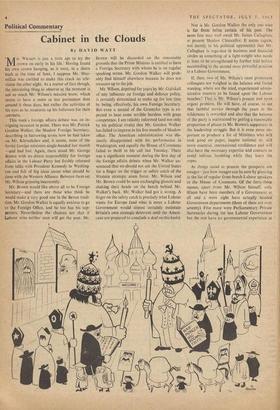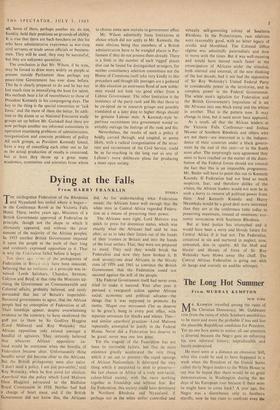Political Commentary
Cabinet in the Clouds
By DAVID WATT
'M R. WILSON is just a little apt to try the crown on early in his life.' Having found his own crown hanging, as it were, in a thorn bush at the time of Suez, I suppose Mr. Mac- millan was entitled to make this crack on tele- vision the other night. As a matter of fact though, the interesting thing to observe at the moment is not so much Mr. Wilson's massive brow, which seems to have a more or less permanent dent around it these days, but rather the activities of his eyes as he measures up his followers for their coronets.
This week's foreign affairs debate was an in- triguing occasion in point. There was Mr. Patrick Gordon Walker, the Shadow Foreign Secretary, describing in harrowing terms how he had taken on Mr. Khrushchev and, it seems, most of the Soviet foreign ministers single-handed last month —and had lost. Again, there stood Mr. George Brown with no direct responsibility for foreign affairs in the Labour Party but freshly returned from talks with President Kennedy in Washing- ton and full of big ideas about what should be done with the Western Alliance. Between them sat Mr. Wilson grinning inscrutably.
Mr. Brown would like above all to be Foreign Secretary—and there are those who think he would make a very good one in the Bevan tradi- tion. Mr. Gordon Walker is equally anxious to go to the Foreign Office, and he too has his sup- porters. Nevertheless the chances are that if Labour wins neither man will get the post. Mr. Brown will be discarded on the reasonable grounds that the Prime Minister is entitled to have a Foreign Secretary with whom he is on regular speaking terms. Mr. Gordon Walker will prob- ably find himself elsewhere because he does not measure up to the job.
Mr. Wilson, deprived for years by Mr. Gaitskell of any influence on foreign and defence policy, is certainly determined to make up for lost time by, being, effectively, his own Foreign Secretary. But even a menial of the Gromyko type is ex- pected to bear some terrible burdens with great competence. I am reliably informed (and not only by his political rivals) that Mr. Gordon Walker has failed to impress in his five months of Shadow office. The American administration was dis- tinctly disappointed with his performance in Washington, and equally the House of Commons failed to thrill to his call last Tuesday. There was a significant moment during the first day of the foreign affairs debate when Mr. Walker an- nounced that we should not ask the United States for a finger on the trigger or safety catch of the , Western strategic atom force. Mr. Wilson and Mr. Brown could be seen whanging glances and shaking their heads on the bench behind Mr. Walker's back. Mr. Walker had got it wrong. A finger on the safety catch is precisely what Labour wants for Europe (and what is more a Labour Government would almost certainly maintain Britain's own strategic deterrent until the Ameri- cans are prepared to conclude a deal on this basis). Nor is Mr. Gordon Walker the only one who is far from being certain of his post. The same fate may well await Mr. James Callaghan, at present Shadow Chancellor. It seems (again, not merely to his political opponents) that Mr. Callaghan is regarded in business and financial circles as something of a light-weight who needs at least to be strengthened by further trial before succeeeding to the secdnd most powerful position in a Labour Government.
If, then, two of Mr. WilsOn's most prominent colleagues are weighed in the balance and found wanting, where are the tried, experienced admin- istrative masters to be found upon the Labour benches? Tbat is Mr. Wilson's present and most urgent problem. He will have, of course, to see that faithful service through the years in the wilderness is rewarded and also that the balance of the party is maintained by getting a reasonable proportion of places to Mr. Brown's supporters in the leadership struggle. But it is even more im- portant to produce a list of Ministers who will look good on paper, inspire national or, still more essential, international confidence and will also have the necessary expertise and contacts to avoid tedious fumbling while they learn the ropes.
As things stand at present the prospects are meagre—just how meagre can be seen by glancing at the list of regular front-bench Labour speakers in the House of Commons. Of the forty-three names, apart from Mr. Wilson himself, only fifteen have been members of a Government at all and a mere eight have actually headed: Government departments (three of these arc over seventy). Five more were Parliamentary Private Secretaries during the last Labour Government but the rest have no governmental experience at all. Some of them, perhaps another six, do not, frankly, hold their positions on grounds of ability. It is true that there are back-benchers on this list who have administrative experience as war-time civil servants or trade union officials or business- men. They will be used; they may be successful; but they are unknown quantities.
The conclusion is that Mr: Wilson, if he wins, may be forced to draw more widely on people at present outside Parliament than perhaps any peace-time Government has, ever done before. This he is clearly prepared to do and he has not lost much time in intensifying the hunt for talent. His methods bear a lot of resemblance to those of President Kennedy in his campaigning days. The key to the thing is the special committee or 'task force,' and the more of them the better. In addi- tion to the dozen or so National Executive study groups set up before Mr. Gaitskell died there are now perhaps another ten informal committees in operation examining problems of administration, reorganisation and concrete problems of policy All such groups, as President Kennedy found, have a way of cancelling each other out so far as the a'ctual production of results is concerned, but at least they throw up a great many academics, economists and scientists from whom to choose some new recruits to government office.
Mr. Wilson admittedly faces limitations in choice which did not apply to Mr. Kennedy, the most obvious being that members of a British administration have to be wangled places in Par- liament if they do not possess them already. There is a limit to the number of such 'rigged' places that can be found for distinguished strangers, for neither constituency selection committees nor the House of Commons itself take very kindly to this procedure and though life peerages are a godsend in this situation an enormous flood of new noble- men would not look too good either from a Labour Government. The other limitation is the insistence of the party rank and file that those to be co-Opted on to research groups and possibly translated at a later date to higher things should be genuine Labour men. A Kennedy-style bi- partisan recruitment into government would in- evitably outrage the feelings of the rank and file.
Nevertheless, the results of such a policy if boldly carried through, and coupled, as seems likely, with a radical reorganisation of the struc- ture and recruitment of the Civil Service, could be as far-reaching in the long run as any of Labour's more deliberate plans for producing a more open society.







































 Previous page
Previous page